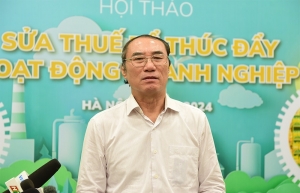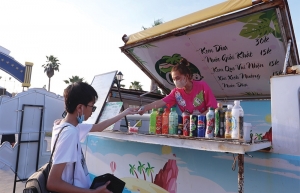Excise tax scope aspires to mitigate economic impacts
At a National Assembly (NA) meeting last week, its standing committee deliberated on the latest draft of the amended Law on Special Consumption Tax (SCT), scheduled for a vote on June 13.
The legislative momentum reflects the country’s growing focus on environmental protection, public health, and market alignment with international practices.
A major outcome from the session is the endorsement of a narrowed tax scope for air conditioners. Under the revised draft, only units with cooling capacity between 24,000 and 90,000 BTU will be subject to excise tax. Units below or above this range will be exempt.
Deputy Minister of Finance Cao Anh Tuan clarified that air conditioners under 90,000 BTU are widely used and are major electricity consumers. Moreover, many of these products still rely on refrigerants that harm the ozone layer, contributing to global warming.
“These concerns have prompted tighter installation regulations in many countries,” he said.
To address various concerns raised by legislators, the drafting agencies have adjusted the scope of excise coverage for air conditioners, effectively narrowing taxable product categories. Estimated tax revenue from this segment would be around $112 million, but the narrowed scope would reduce that by an estimated $33.6 million.
On the contentious issue of petrol, Tuan reaffirmed that fuel has long been subject to excise tax in Vietnam. The tax plays a dual role: generating revenue and advancing Vietnam’s commitments to reduce greenhouse gas emissions.
He stressed that taxation serves as a policy tool to incentivise cleaner fuel consumption, such as E5 and E10 biofuels, which are taxed at 8 and 7 per cent, respectively, lower than the 10 per cent rate for conventional petrol.
Furthermore, the Ministry of Industry and Trade is consulting the government to upgrade national fuel standards to E10 or even E20, aligning Vietnam with practices in other economies. In this context, the excise tax becomes an important lever to encourage a biofuel transition.
Also under scrutiny was the decision to impose an excise tax on sugary beverages. Lawmakers expressed concern about the clarity and health rationale of such a policy. Tuan explained that only beverages with sugar content exceeding 5g per 100 millilitres would be subject to the tax, excluding items like milk, nutritional drinks, fruit nectar, natural juices, coconut water, and cocoa-based products.
Globally, the trend of taxing sugary drinks is gaining traction. From just 15 countries in 2012, more than 100 jurisdictions now implement some form of sugar tax. “The goal is to gradually raise public awareness and curb sugar consumption,” he said, echoing the strong support from the Ministry of Health (MoH) and international health organisations.
In the initial phase, the draft proposes a modest excise rate of 8–10 per cent, with the effective date postponed until 2027.
Chairman of the NA’s Economic and Financial Committee Phan Van Mai also weighed in, affirming the necessity of keeping petrol and air conditioners under tax consideration despite being essential items.
“Encouraging frugality and energy-saving practices must become the norm. Even the most advanced air conditioners emit GHGs, just less so,” he said.
Mai emphasised that Vietnam’s forthcoming Law on Economical and Efficient Use of Energy will further promote such behavioural shifts, and that taxation plays a supportive role in guiding consumer habits.
On the subject of long-term fiscal policy, the supervising agencies also agreed that a harmonised reform of both the SCT and Environmental Protection Tax should be considered. While the current approach preserves the excise tax on petrol, future revisions may rebalance this structure for greater policy coherence and alignment with international norms.
The committee unanimously agreed that the excise tax continues to be a critical tool to protect public health, especially when applied to alcohol, tobacco, and sugary beverages. Reports from the MoH and professional associations, including the World Health Organization, consistently call for higher and more immediate taxation.
However, to mitigate the economic impact on producers and consumers, the current draft proposes lower rates with a delayed rollout, beginning in 2027.
Ultimately, the National Assembly Standing Committee endorsed the revised draft’s core proposals and called for further refinement. “We agree to maintain sugary drinks and petrol within the excise tax scope, but the drafting bodies must strengthen the policy rationale and provide clear explanations to the NA,” said NA Vice Chairman Nguyen Duc Hai.
 | Tax changes require more scientific basis The Ministry of Finance is set to put more special consumption taxes on several types of drink. Nguyen Van Phung, former director of the Department of Tax Administration for Large Enterprises, spoke to VIR’s Huong Uyen about issues related to the draft law on this type of levy. |
 | Options narrow for tax on beer products Research experts have quantified options for increasing special consumption tax on beer, which are expected to help policymakers come up with a solution that harmonises benefits. |
 | Lawmakers make case for consumption tax additions The Ministry of Finance’s plan to inflict a special consumption tax on air conditioners and sugary drinks has received mixed responses from many lawmakers and experts. |
What the stars mean:
★ Poor ★ ★ Promising ★★★ Good ★★★★ Very good ★★★★★ Exceptional
Related Contents
Latest News
More News
- Masan Consumer names new deputy CEO to drive foods and beverages growth (February 23, 2026 | 20:52)
- Myriad risks ahead, but ones Vietnam can confront (February 20, 2026 | 15:02)
- Vietnam making the leap into AI and semiconductors (February 20, 2026 | 09:37)
- Funding must be activated for semiconductor success (February 20, 2026 | 09:20)
- Resilience as new benchmark for smarter infrastructure (February 19, 2026 | 20:35)
- A golden time to shine within ASEAN (February 19, 2026 | 20:22)
- Vietnam’s pivotal year for advancing sustainability (February 19, 2026 | 08:44)
- Strengthening the core role of industry and trade (February 19, 2026 | 08:35)
- Future orientations for healthcare improvements (February 19, 2026 | 08:29)
- Infrastructure orientations suitable for a new chapter (February 19, 2026 | 08:15)

 Tag:
Tag:



















 Mobile Version
Mobile Version